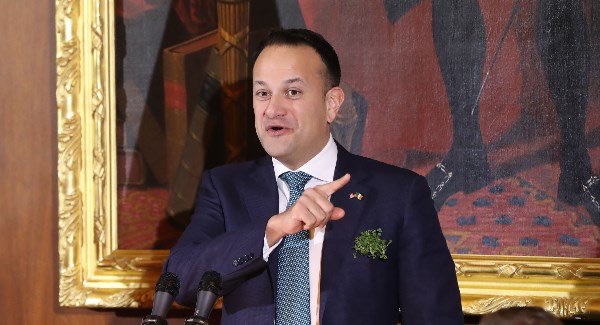
The 26 County Taoiseach Leo Varadkar is facing calls to resign after he bragged about how he subverted the state’s planning process on behalf of Donald Trump’s business interests during the traditional St Patrick’s Day lunch in Washington DC.
The Taoiseach told an audience in Washington that included President Trump that, when he was minister for tourism, the billionaire called him to complain about a “problem” he had with a planned wind farm near his Doonbeg golf resort in west Clare and that Mr Varadkar subsequently called the council about it.
The Taoiseach said he initially thought the call was “a piss-take by one of my staff members” as he thought a businessman like Mr Trump would write a letter first to set up a meeting.
“But, as we all know, President Trump does work like that. He is a very direct man, likes to get things done,” he said.
The intervention from Varadkar as Minister for Tourism was enough to prevent windmills blighting the vista of Trump’s wealthy golfing clients. At the time, Trump tweeted “great news from Ireland” when the council refused planning permission.
In his apparent attempt keen to ingratiate himself with the US President on Thursday, the Taoiseach exaggerated his intervention to Clare County Council by suggesting he acted directly. He subsequently admitted his intervention was made under the cover of Failte Ireland, the Irish Tourism body.
Insider influence and cronyism is rife in the planning process in Ireland, despite the process being supposedly independent from political interference. In the past, corrupt Irish politicians have publicly bragged of their ability to pull ‘strokes’ -- circumvent planning legislation -- in order to demonstrate their prowess for supporters.
Varadkar’s actions are in the mould of the stereotypically corrupt Irish politician, but in this case he naively sought credit for ‘pulling a stroke’ in front of the world’s media.
Sinn Fein planning spokesman Eoin O Broin called on Minister for Housing Eoghan Murphy to appoint an independent planning expert to investigate the Taoiseach’s comments on his intervention over the Doonbeg wind farm and to report his findings to the Oireachtas housing committee.
“If the Taoiseach believes that he has done nothing wrong, he should encourage such an intervention,” said Mr O Broin.
He expressed surprise that Mr Varadkar “couldn’t tell the difference between contacting the council and Failte Ireland, particularly on a high-profile case that he has spoken about twice in the public arena”.
The Sinn Fein TD questioned whether a member of the public who rang Mr Varadkar up about a wind farm would have got through to the minister and had him make a representation on their behalf to Failte Ireland.
“Given how toxic our planning history is and the toxic relationship between politicians and the planning process, why would the Taoiseach think it appropriate to talk lightly about wielding influence for a businessman and doing what he could on a planning matter?” said Mr O Broin.
“It shows a clear lack of judgment. It is not like this is an off-the-cuff story; he had told this story before publicly.”
The Taoiseach denied that his extraordinary remarks were a gaffe, and insisted his actions were not unethical.
“A person, a businessman was investing in tourism in Ireland as people do,” he said. “They invest in attractions, they invest in hotels and that person raised an issue with me.
“I did what was entirely appropriate which was to pass on those concerns to the relevant statutory agency and I did so in writing. That is what any tourism minister should do.”
The businessman behind a failed plan to build a wind farm near Doonbeg said he was disappointed Mr Varadkar had interfered in the planning process.
The proposal by Clare Coastal Wind Power to erect a nine-turbine wind farm about 4km from the golf resort was twice refused planning permission, costing the firm about [euro]500,000.
Michael Clohessy, director of the company, said it would be “reviewing this situation” after Mr Varadkar’s comments.
![[Irish Republican News]](https://republican-news.org/graphics/title_gifs/rn.gif)
![[Irish Republican News]](https://republican-news.org/graphics/title_gifs/harp.gif)

